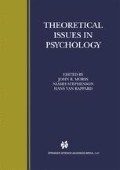Summary
One of the problems arising in the representationist approach to cognition is that of the homunculus. How can cognition occur unless there is an inner “little man” who knows both what the representations are and what they represent? Dennett’s “intentional stance” account proposes a way out. By analogy with computer processes (e.g. we speak of “chess-playing” computers when, in fact, they know literally nothing about chess or anything else), it can be seen that human cognition can be analysed down to basic processing assemblies which are cognitively attenuated (“stupid”, “pseudo-cognitive”). Accordingly there is no need for representations, and so there is no homunculus problem. Dennett’s solution is unworkable: the notion of pseudo-or proto-cognition is unsustainable. Must the homunculus be reinstated? Not at all: the direct realist account of cognition as an irreducible relation provides a radical but coherent alternative.
Access this chapter
Tax calculation will be finalised at checkout
Purchases are for personal use only
Preview
Unable to display preview. Download preview PDF.
References
Anderson, J. (1962). The knower and the known. In Studies in empirical philosophy (pp. 27–40 ). Sydney: Angus & Robertson. (Original work published 1927 ).
Baker, A. J. (1986). Australian realism: The systematic philosophy of John Anderson. Cambridge: Cambridge University Press.
Dennett, D. C. (1979). Brainstorms: Philosophical essays on mind and psychology. Hassocks. Sussex: Harvester Press.
Dennett, D. C. (1987). The intentional stance. Cambridge, MA: The MIT Press.
Dennett, D. C. (1996). Kinds of minds: Towards an understanding of consciousness. London: Weidenfeld & Nicolson.
Hume, D. (1888). Treatise of human nature, L.A. Selby-Bigge (Ed.). Oxford: Oxford University Press. ( Original work published 1739 ).
Mackie, J. L. (1985). The philosophy of John Anderson. In Logic and knowledge: Selected papers, Vol. I, J. Mackie and P. Mackie (Eds) (pp. 1–21 ). Oxford: Clarendon Press.
Miller, J. (Ed.) (1983). States of mind. London: British Broadcasting Corporation.
Petocz, A. (1999). Freud, psychoanalysis and symbolism. Cambridge: Cambridge University Press.
Author information
Authors and Affiliations
Editor information
Editors and Affiliations
Rights and permissions
Copyright information
© 2001 Springer Science+Business Media New York
About this chapter
Cite this chapter
McMullen, T. (2001). Getting Rid of the Homunculus: A Direct Realist Approach. In: Morss, J.R., Stephenson, N., van Rappard, H. (eds) Theoretical Issues in Psychology. Springer, Boston, MA. https://doi.org/10.1007/978-1-4757-6817-6_14
Download citation
DOI: https://doi.org/10.1007/978-1-4757-6817-6_14
Publisher Name: Springer, Boston, MA
Print ISBN: 978-1-4419-4890-8
Online ISBN: 978-1-4757-6817-6
eBook Packages: Springer Book Archive

